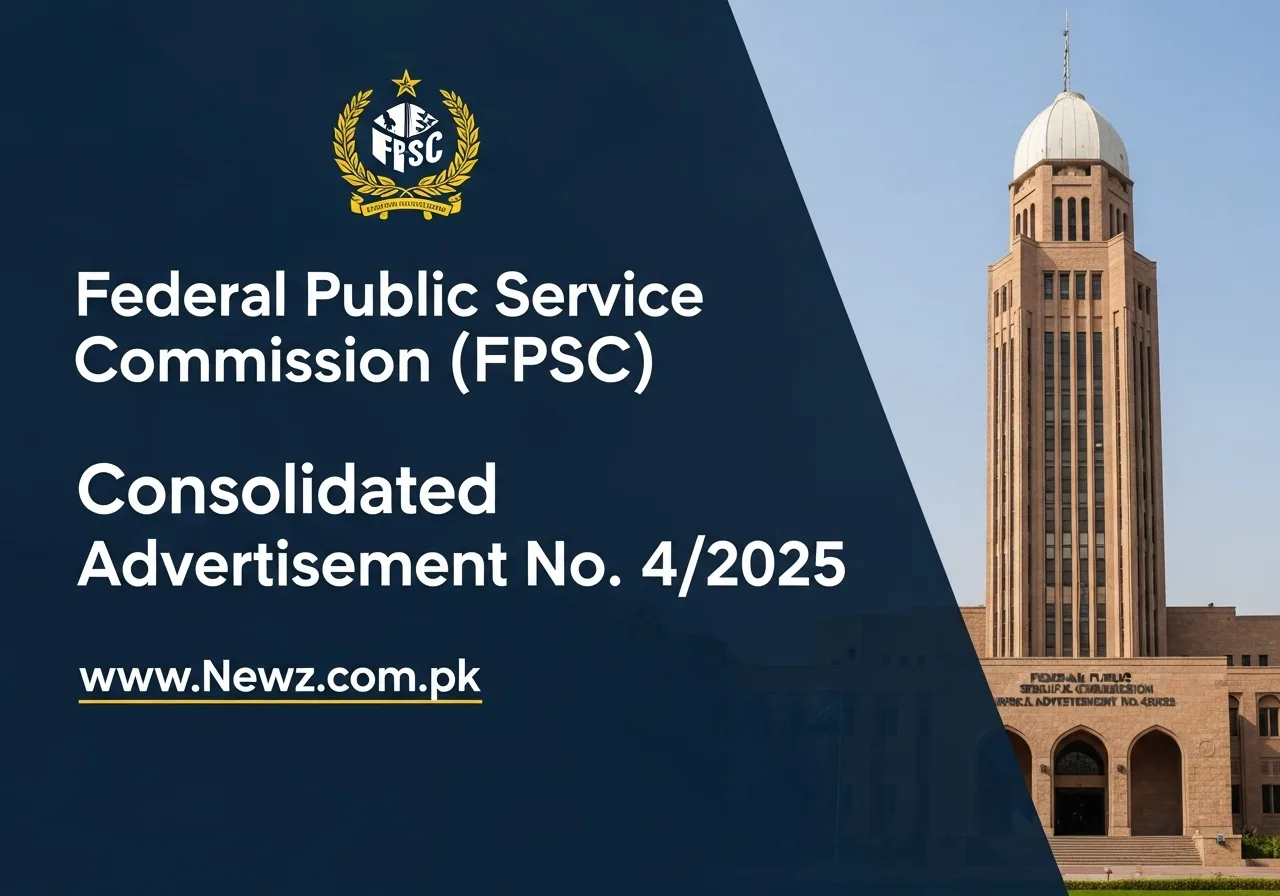A Blueprint for National Service: An In-Depth Analysis of FPSC Consolidated Advertisement No. 5/2025
Introduction: The Apex of Public Sector Recruitment
The Federal Public Service Commission (FPSC) stands as the constitutional guardian of Pakistan’s merit-based recruitment system for the federal bureaucracy. Operating under Article 242 of the Constitution of the Islamic Republic of Pakistan, the FPSC is tasked with the monumental responsibility of ensuring that positions in Basic Pay Scales (BS-16 and above) are filled by the most competent and qualified individuals across the nation. This critical function is not merely an administrative exercise; it is the cornerstone of effective governance, directly impacting national policy implementation, security, and socio-economic development.
In this context, the release of a Consolidated Advertisement is a landmark event for thousands of aspiring civil servants. Consolidated Advertisement No. 5/2025, as evidenced by the official documents , represents a massive recruitment drive designed to inject new blood and specialized expertise into various federal ministries and divisions. It is a comprehensive blueprint detailing vacancies ranging from specialized technical roles to key administrative posts like Assistant Director (BS-17), offering a definitive pathway for Pakistan’s young talent to enter the federal government. This article provides an exhaustive analysis of this advertisement, covering the scope of opportunities, the critical selection process, and the indispensable General Instructions that every candidate must follow.
The Federal Public Service Commission (FPSC): Gatekeeper of Pakistan’s Bureaucracy
The history and mandate of the Federal Public Service Commission are deeply intertwined with the development of Pakistan’s administrative state. Established post-independence under the principles laid down by its colonial predecessor, the FPSC’s primary goal remains the institutionalization of *merit (Qoumi)**—a commitment to fair and transparent selection regardless of social, economic, or political affiliation.
Core Functions and Constitutional Mandate
The FPSC’s operations are governed by the FPSC Ordinance, 1977, and Article 242 of the Constitution. Its functions extend far beyond the mere conduct of examinations. It is fundamentally responsible for:
- Recruitment: Conducting competitive examinations (like the CSS) and general recruitment tests for appointments to All-Pakistan Services, the Civil Services of the Federation, and civil posts in connection with the affairs of the Federation in BS-16 and above.
- Advisory Role: Advising the President on matters related to the qualifications, methods of recruitment, and principles of initial appointment and promotion.
- Appeals and Reviews: Handling review petitions and representations from aggrieved candidates, ensuring administrative justice within the selection framework.
The general recruitment process, which is initiated through Consolidated Advertisements, is critical for filling specialist and technical posts. Unlike the CSS, which recruits generalists, the General Recruitment (GR) stream targets individuals with specific academic qualifications (e.g., Engineering, Medicine, IT, Education) and often requires verifiable post-qualification experience. This specialization ensures that federal departments are equipped with the technical expertise needed for their mandates, from atomic energy to health regulation.
The sheer volume and diversity of openings in Consolidated Advertisement No. 5/2025 underscore the government’s need for a robust and professional workforce. An analysis of the advertised vacancies—from Programmer (BS-17) in the Ministry of Defence to Clinical Psychologist (BS-17) in Health Departments, and numerous Lecturer (Female) (BS-17) positions—reveals a significant national investment in technical, educational, and defense-related human resources. The recruitment drive is a direct reflection of national strategic priorities, requiring the FPSC to deploy its extensive testing and interviewing mechanisms to secure the best talent.
Decoding the Vacancies: A Sectoral Analysis of Key Opportunities in BS-17 and Above
The most compelling aspect of Consolidated Advertisement No. 5/2025 is the extensive list of open positions, particularly at the BS-17 level, which serves as the entry point for officers into the federal administration outside of the CSS structure. This section categorizes and elaborates on the nature of these opportunities, highlighting the qualifications and experience necessary for success.
1. The Administrative and Financial Cadres (The Backbone)
Positions like Assistant Director (BS-17) and various accounting roles are the lifeblood of administrative continuity. The Assistant Director post, often requiring a Master’s degree in fields like Public Administration, Business Administration, or Islamic Studies (depending on the ministry), is a crucial management and coordination role.
- Assistant Director (BS-17) Duties (Inferred): These officers are typically involved in policy implementation, departmental coordination, report writing, and administrative supervision. They act as a critical link between senior management and the operational staff, requiring sharp analytical and managerial skills. For example, an Assistant Director in the Ministry of Religious Affairs (as advertised) would handle administrative tasks related to religious policy, Hajj/Umrah operations, and coordination with provincial departments.
- Accountant (BS-16) and Manager Finance: These positions demand a strong foundation in finance, commerce, statistics, or accounting. The shift to a digital and transparent economy means these roles require high competence in financial management software and compliance with federal audit rules, moving beyond traditional bookkeeping.
2. The Specialist Cadres: IT, Engineering, and Technical Expertise
Modern governance is data-driven, and this advertisement clearly signals a high demand for specialized technical personnel.
- Programmer (BS-17), Database Administrator (BS-17), and Network Administrator (BS-17): Found in organizations like GHQ (Ministry of Defence) and the Attorney General’s Office, these roles are central to cyber security, data management, and the maintenance of critical IT infrastructure. The required qualifications—Master’s or a four-year Bachelor’s in Computer Science/IT—confirm the need for modern, highly educated professionals. The FPSC screening tests for these positions often include a significant professional component (80% of the paper) focused on advanced concepts like data communication, operating systems, and software engineering.
- Boiler Engineer (BS-17) and Assistant Executive Engineer (Civil) (BS-17): Engineering posts require mandatory registration with the Pakistan Engineering Council (PEC) and relevant experience. These roles are foundational to national infrastructure and industrial regulation. The Engineer roles advertised, for instance in Gilgit-Baltistan (GB), speak to massive ongoing infrastructure development projects, requiring hands-on expertise in design, supervision, and project management.
3. The Health and Wellbeing Sector
The advertisement highlights the necessity of specialists in healthcare, a critical need for the federal administration, especially in geographically sensitive areas.
- Clinical Psychologist (BS-17) and Veterinary Officer (BS-17): The demand for Clinical Psychologists (for instance, in the Health Department of GB) reflects a growing national focus on mental health services. Similarly, the Veterinary Officer position in the Remount Veterinary & Farms Directorate is vital for the logistical and operational integrity of defense-related infrastructure, requiring a Doctor of Veterinary Medicine (DVM) degree and specific professional registration.
- Medical and Allied Staff (BS-16/17): Though only partially visible, such advertisements historically include Medical Officers and allied health professionals, all requiring registration with the Pakistan Medical & Dental Council (PM&DC) or Pakistan Nursing Council (PNC).
4. The Education Sector: Shaping the Future (Lecturers BS-17)
The largest single category of openings is often in the education sector, specifically for Lecturer (Female/Male) (BS-17) in the Federal Directorate of Education (FDE) and other institutions. The advertisement mentions a staggering ninety-eight (98) vacancies for Lecturer (Female) alone, across multiple subjects (Biology, Chemistry, Computer Science, English, Physics, Urdu, etc.).
- Significance: This mass recruitment is a direct effort to improve the quality of federal educational institutions. It ensures that specialized subject knowledge is taught by competent professionals with a Master’s degree in the relevant discipline. The sheer number of vacancies and the broad range of categories underscore the government’s commitment to strengthening the academic foundation of its schools and colleges.
- Preparation Strategy: Candidates for these roles must prepare for a professional test that combines the core subject matter (70-80% weightage) with pedagogical and teaching methodology concepts, as indicated in FPSC’s syllabi.
The Importance of BS-17 and the Quota System
The BS-17 scale is significant as it marks the beginning of the officer-level cadre. Successful candidates embark on a career path that can lead to promotion up to BS-22. The advertised quota system (Merit, Punjab, Sindh Rural/Urban, Khyber Pakhtunkhwa, Balochistan, Ex-FATA, Gilgit Baltistan, AJK, Minorities/Non-Muslims, and Women Quota) is an essential constitutional mechanism. It ensures geographical and demographic representation in the federal services, promoting national cohesion and providing opportunities for talented individuals from all parts of Pakistan. Candidates must apply strictly according to their documented domicile and the prescribed quota.
Navigating the FPSC Application Procedure: Essential General Instructions and Submission Guidelines
The FPSC application process, while entirely online, is highly rigorous and unforgiving of clerical errors. Adherence to the General Instructions to the Candidates is non-negotiable, and any deviation can lead to the outright rejection of candidature.
1. The Online-Only Submission Mandate
- Exclusivity: All applications for General Recruitment in BS-16 and above must be submitted exclusively online via the official FPSC website. No manual or hard copy application is entertained. This mandate ensures an auditable and streamlined process.
- Deadline: Eligibility, including all qualifications, experience, and age, is strictly reckoned up to the closing date of the advertisement (e.g., November 24, 2025, in the case of this advertisement). Crucially, the result for the minimum required qualification must be officially announced by the Controller of Examination on or before this cut-off date.
2. Fee Payment and PSID Generation
The application fee (which varies by the Basic Pay Scale of the post) must be paid online against a unique PSID (Payment Slip ID) generated by the FPSC Online Portal.
- Method: Payment is made using the 1-Link facility (ATM, Mobile/Internet Banking, or Over the Counter at any 1-Link member bank). The original proof of payment (e.g., the original Treasury Receipt or bank confirmation) is a vital document that candidates must retain and produce at the time of the Screening/Written Test. Failure to provide this receipt is grounds for immediate rejection.
3. The Finality of the Online Form and Subsequent Claims
A major point of caution emphasized in the FPSC guidelines relates to the finality of the information submitted.
- Data Integrity: The information claimed in the online application form is treated as final. Subsequent claims of qualification or post-qualification experience, if not initially entered in the online form, are viewed by the Commission as an “afterthought” or an attempt to become eligible later. Such subsequent claims shall not be accepted, especially if the experience is from a private organization. This makes meticulous and careful submission of the initial application paramount.
- Post-Qualification Experience Defined: The FPSC meticulously defines post-qualification experience as experience gained in a regular, full-time paid job after the date of attaining the minimum requisite advertised qualification (i.e., after the official result announcement date). Experience gained part-time, as an internee/apprentice (unless otherwise specified), or honorary/self-employed work is generally not counted.
4. Document Scrutiny and the Bio-data Form
The recruitment process is multi-phased. After the written test, candidates are shortlisted (usually at a ratio of 1:10 or 1:15, depending on the post) to submit their Bio-data Form and attested copies of all relevant documents.
- The Second Vetting: This is the most crucial stage for eligibility verification. Candidates must submit:
- Attested copies of CNIC, Domicile Certificate, and educational degrees/certificates.
- Original Treasury Receipt of the deposited fee.
- Valid Registration Certificates (e.g., PEC, PM&DC, PNC) where applicable.
- Experience Certificates detailing the start/end dates and the nature of work.
- The Warning: Issuance of the notice for document submission does not guarantee shortlisting for the interview. The final selection for the interview depends solely on the detailed scrutiny of these documents. Candidates who fail to furnish the documents within the stipulated time, or if the documents reveal incorrect/incomplete information contrary to the online form, are rejected without further recourse.
5. Departmental Permission Certificate (DPC) and Age Relaxation
- Government Servants: Candidates already in Government service are mandated to obtain a Departmental Permission Certificate (DPC) or No Objection Certificate (NOC) prior to applying and must provide its reference number/date in the online application.
- Age Relaxation: While a five (5) years general relaxation in the upper age limit is standard, other specific relaxations exist for various categories (e.g., government servants, disabled persons, residents of specific areas like Gilgit-Baltistan). Candidates must carefully determine the total admissible age relaxation to ensure they do not exceed the final age limit.
Frequently Asked Questions (FAQs) on FPSC Advertisements and Selection
The complexity of the FPSC system often leads to common queries from applicants. Addressing these helps preemptively clarify the process.
Q1: What is the most common reason for the rejection of an FPSC application?
A: The most common reasons are:
- Late Fee Payment: Fee not deposited on or before the closing date.
- Lack of Requisite Qualification/Experience: The minimum qualification result or required post-qualification experience was not attained/completed by the closing date.
- Discrepancy in Information: A mismatch between the data claimed in the online application and the physical documents submitted later.
Q2: What is the weightage of the written test versus the interview for a BS-17 post?
A: For BS-16 and BS-17 posts, the selection is typically based on the cumulative merit of the written/screening test and the interview. The interview for BS-16 and BS-17 posts usually carries 200 marks, with a qualifying threshold (e.g., 101 marks). The ratio of candidates called for the interview is generally 1:5 to 1:10 of the advertised vacancies, depending on the post and number of applicants.
Q3: Can I edit my online application after submission?
A: Yes, the FPSC usually allows candidates to edit on-line applications only once within the closing date in order to rectify any error or omission. Once the closing date passes, the information is locked and considered final.
Q4: Is a result card/mark sheet considered sufficient proof of qualification if the degree is not issued yet?
A: No. The FPSC requires proof that the result was officially announced by the Controller of Examination on or before the closing date. While the final degree certificate is preferred, an official notification of the result from the University’s Controller of Examinations is often accepted, but a mere mark sheet may be insufficient without official evidence of the announcement date.
Q5: What is the importance of the Domicile Certificate in the FPSC process?
A: The Domicile Certificate determines the candidate’s eligibility for a specific provincial or regional quota. The FPSC only accepts the Self Domicile Certificate (SDC) of the candidate. The quota system is strictly enforced to ensure fair representation as per the government’s prescribed rules.
Conclusion: A Call to Aspiring Civil Servants
Consolidated Advertisement No. 5/2025 is a definitive opportunity for Pakistan’s highly educated and skilled youth to secure a career in the federal government. The scope of the vacancies—from IT to Education, all at the pivotal BS-17 level and above—underscores a national commitment to meritocracy and specialized governance. Success in the FPSC process hinges not only on academic excellence but also on the meticulous adherence to the General Instructions, correct claiming of experience, and timely application submission. Aspiring candidates must treat the application process with the utmost seriousness, recognizing that a career as a federal officer is a profound commitment to national service and development.








